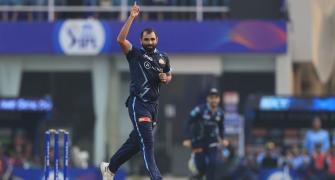International Olympic Committee (IOC) President Jacques Rogge informed his organisation's members on Friday he intends to stand for a second term in office, the IOC said.
IOC spokeswoman Emmanuelle Moreau said the 66-year-old Rogge, first elected in 2001 for an eight-year term, has sent a letter to all members saying he would run for a second term during the election to be held next year in Copenhagen, Denmark.
No other IOC member has announced their intention to run for the position of president and Rogge is likely to win unopposed.
"Jacques Rogge today sent a letter to all IOC members announcing his candidature for a second, four-year term as IOC President," Moreau said.
Senior IOC members welcomed his decision.
"This is the right decision because eight years is too short and 12 years is enough time for him to complete his work," IOC vice-president Lambis Nikolaou said.
Nikolaou said there would not be another candidate.
"When an acting president is up for re-election there has never been anyone standing against him and this will be the case next year as well," Nikolaou said.
Rogge had said success or failure of this summer's Beijing Olympics would largely dictate his decision on running again.
The Games turned out to be a financial success for the IOC, whose revenues are set to continue to grow into the next four-year period despite the global economic downturn.
The IOC was under constant criticism for awarding the Games to China given the country's human rights record. Rogge had defended the IOC's decision saying the Games were a force for good.
CORRUPTION SCANDAL
Rogge, a Belgian, succeeded Juan Antonio Samaranch as only the eighth IOC President since the organisation was founded in 1894, two years prior to the first modern Games.
His second term, should he win, will only be for four years following changes to the duration of the president's term since the time of Samaranch, who spent 21 years as IOC chief.
Rogge took over the IOC at a sensitive time when the organisation was wounded by the Salt Lake City corruption scandal involving bribes in return for votes from members.
Several IOC members were forced out and others reprimanded in an affair that damaged the credibility of the IOC.
Rogge presided over his first Games as IOC chief in Salt Lake City in 2002 and at his first summer Olympics in Athens four years ago. He also presided over the Turin 2006 and Beijing 2008 Olympics.
If he wins his second term he will be in charge for two more Games -- the Vancouver 2010 Winter Olympics and the London 2012 Summer Games.
Rogge has led the IOC's tough stance against doping in sport calling for stiffer sentences, more tests and pursuing the athletes' entourage to stamp out illegal drug-taking that has repeatedly marred top performances at the Games.
The soft-spoken Belgian is also responsible for creating the Youth Olympic Games, a tool aimed at attracting a new generation of future Olympians and a younger global audience.
An orthopaedic surgeon by profession, Rogge has a 40-year involvement with the Olympics, as a sportsman, a national Olympic team official and as an IOC member since 1991.
He also competed in three editions of the Games as a yachtsman from 1968 to 1976 and played rugby for Belgium.









